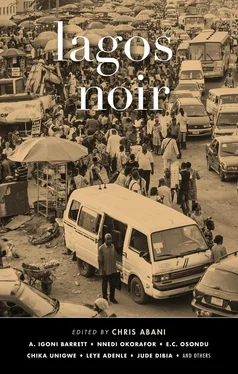Ннеди Окорафор - Lagos Noir
Здесь есть возможность читать онлайн «Ннеди Окорафор - Lagos Noir» весь текст электронной книги совершенно бесплатно (целиком полную версию без сокращений). В некоторых случаях можно слушать аудио, скачать через торрент в формате fb2 и присутствует краткое содержание. Город: New York, Год выпуска: 2018, ISBN: 2018, Издательство: Akashic Books, Жанр: Детектив, на английском языке. Описание произведения, (предисловие) а так же отзывы посетителей доступны на портале библиотеки ЛибКат.
- Название:Lagos Noir
- Автор:
- Издательство:Akashic Books
- Жанр:
- Год:2018
- Город:New York
- ISBN:978-1-61775-523-1
- Рейтинг книги:4 / 5. Голосов: 1
-
Избранное:Добавить в избранное
- Отзывы:
-
Ваша оценка:
- 80
- 1
- 2
- 3
- 4
- 5
Lagos Noir: краткое содержание, описание и аннотация
Предлагаем к чтению аннотацию, описание, краткое содержание или предисловие (зависит от того, что написал сам автор книги «Lagos Noir»). Если вы не нашли необходимую информацию о книге — напишите в комментариях, мы постараемся отыскать её.
Lagos Noir — читать онлайн бесплатно полную книгу (весь текст) целиком
Ниже представлен текст книги, разбитый по страницам. Система сохранения места последней прочитанной страницы, позволяет с удобством читать онлайн бесплатно книгу «Lagos Noir», без необходимости каждый раз заново искать на чём Вы остановились. Поставьте закладку, и сможете в любой момент перейти на страницу, на которой закончили чтение.
Интервал:
Закладка:
Now a buyer was requesting two particularly large corn cobs, evenly browned on all sides from where they lay on the coal wire mesh. Bisola quickly plucked them off the mesh in swift motions, blowing on her fingers to soothe the sting. She bent over to rip a page off a heap of newspapers in the corner, and as she wrapped the steaming cobs in the paper, the customer said, “You’re forgetting the coconuts, na.”
Bisola tapped her waist and thumped her chest softly. She blinked. “Sorry,” she replied, and leaned over, cradling her stomach to reach the basin of shelled coconuts.
“Ah, this belly issue is getting in the way,” the buyer said with a grin. “Since this belly, Bisola has been forgetting, na.”
The other customers laughed. One woman piped up: “And you people think carrying baby is easy? God should have made you men share in the work too. Then we’ll see who’ll cry first.”
A man not far away scoffed. “Huh? What is there to cry about? Baby business? You mean making baby? But that’s easiest of all!”
Bisola, with a face flushed from the heat of her ashes and a chest filled with the acid of her badly digested lunch, did not flash her dimples this time at the teasing. She let them talk, trying to ignore the sensations of stiffness in her shoulders, peering above the customers’ heads as if searching for something in the horizon. Her mind held a ticking clock inside. This moment — the sun setting over the barracks, the young children peddling biscuits and wristwatches, the motorcycle riders fleeing annoyed traffic wardens — all pointed to the fact that it was about six p.m., offices were closed, the prayer meeting was at hand, and Osei would be arriving soon to pick her up.
She watched the signs, marking the bustling world through the fumes rising from her pan of oil.
When the last batch of akara was served up, she refused to mix a new batter. She sprinkled water on the coals and slowly rose to her feet. The customers in line raised a fuming chorus. She said, as quietly as she could, “I don close. Come back tomorrow.” Then she uprooted the sun umbrella from the soft earth and folded it like a pocketknife. Through the threats of departing customers, none of which she responded to, she gathered her wares of business: the glass showcase for fried gizzards, the now-empty basin for holding coconuts preserved in water, the wire mesh, raffia fan, sitting stool, coal pot, batter pot, and plastic spice containers; and stacked these items inside the slanted shed of zinc and cardboard. She sat on the stool inside, pulling the door slightly closed so she could still see Osei arrive. She stretched her long, trunk-sized legs before her, huffing and belching and thumping her chest softly.
Twice she leaned forward to peer through the door at the sound of an approaching motorcycle, and then she stepped outside to study the roads carefully. It was darker now, the sun had set completely, leaving a faint yellow cast on the general’s face of stone. His boots, surrounded here and there by dogs plodding among small patches of grass, held her attention for a moment before she remembered that she didn’t want to be seen by persistent customers thinking she had changed her mind. She watched the roundabout again, noticing a traffic warden blowing a whistle and charging at a ducking and laughing motorcycle man; a child hawking Coke ran after a motorist for his money; and a distant bugle blared from the barracks. The prayer meeting was at six thirty. Now traffic was almost locked. Did Osei not leave his shop in time?
She retreated to the shed and checked the collection of gifts again. She could tell, from placing her hands around the food warmer, that the specially reserved akara balls were still hot, along with the gizzards in the saucer inside the warmer. There was a bundle of three yams tied together with a string. And there was the broiler chicken, now too tired to squawk, lying quietly on its side and blinking in the dimness of the shed. Bisola turned to the door, her face pressed to the rotting zinc. Osei had not left his shop in time.
When the rattling combustion sounds of his motorcycle finally drew near, she was on her feet to greet him. He hurried in like there was a secret he had been rushing to say, but just as the putrid air of the chicken’s shit hit his nose, he stopped and rubbed his goatee. He turned to his wife, who was watching him from her towering height.
“Bisi,” he said.
“We’re late, my husband.”
Osei rubbed his forehead. He smelled like the orange air freshener that hung above his barbershop mirror. He stroked his goatee again, then examined his fingernails. His delicate lips moved as if to kiss something in the air. Then he was saying, “The customers, today’s business...”
“I have the money for the pastor. It’s all right.”
Osei nodded, but did not look up.
Bisola motioned to the stool. “Sit.”
He lowered himself carefully onto the stool, his legs pressed together like a girl’s. He polished off his dinner as soon as Bisola served it, and while she put the empty plates away, he found a tortoiseshell comb in his breast pocket and brushed his hair in three quick strokes: one each for the flat sides along his ears and another for the well-greased punk outgrowth in the middle. He rose to his feet and his eyes smiled. “Look at this stinking shit. But what has this chicken been eating all day! Your roasted corn, eh?”
“Take the yams and the food,” Bisola replied. “I’ll carry the chicken.”
Osei flexed his shoulders, cracked his fingers. “I feel alive!”
Bisola picked up the now-clucking chicken. As she found a string to tie its feet together, Osei said, “What if I grabbed these volleyballs the way you’re grabbing that chicken?” He took hold of her ample behind, one throbbing cheek in each palm. He wriggled them around in her cotton dress. “Jigi-jigi! Look at that!”
Bisola tapped her chest, trying to hold down a belch.
“And the ball in front!” Osei rubbed her stomach, cackling loudly.
Bisola opened the squeaky door and stepped into the night. Osei followed her, still talking, and after he watched her secure the chicken to the back carrier of his motorcycle, he remembered he had left his keys inside the shed. When he reappeared a moment later with keys in hand, he was quiet, his lips puckered and contemplating. Bisola climbed into the backseat, securing the machine with her weight so he could get on with ease. She angled her frame so that Osei’s elbows would not bump against her stomach. As he started the ignition, she asked in a soft voice, “You think baby can feel your hand now?”
He paused. “My child. My own child.” He pumped the cycle’s pedal with a small foot. “When the pastor brings it back to life.”
Osei zoomed in the direction of the roundabout.
The pastor with the long name — Joshua Isefudiah Promise Esoko Loveday — was no ordinary pastor, like the ones used for headaches and small fevers. It was known that his name, meandering as it was, was that way because an angel had bestowed it on him in the nine minutes the man, while yet unconverted, had died in a drinking parlor, gone to hell, then heaven, and back to earth. To consolidate his mission, the pastor received what he said was a designation of numbers from the angel. It didn’t matter what the problem was; there was a fixed length of time in heaven for every problem on earth. The angel broke down the numbers to him in a prehistoric code, one that had existed since languages evolved from Babel of Bible times. First the pastor would lay a hand on a believer’s head, determine the root cause, and the number of hours, days, or months needed to pray till it was all over.
Bisola’s was three thousand years, reduced to three days, because the pastor said that with God, a day was like a thousand years. And three was a figure that held the power of resurrection, since Jesus lay in the tomb three days and three nights. Three sessions of prayer over three days and the dead would be restored to life. Two done and one left. This was what Bisola’s ticking clock indicated as she was pulled on her husband’s motorcycle, through the dust gathering on her thick calves, along thirteen kilometers of traffic on the bridge off the mainland of Lagos, till they found themselves in the fishing settlements. The houses started passing as soon as they came off the bridge, slowly pulling into Yaba where a fork appeared in the main street, leading the way to the defunct plastic factory. Behind the factory was a complex of administrative offices, long and curving slightly. The offices stretched side by side for kilometers, but the pastor had claimed only a few, along with the reception lobby which could seat close to a hundred people.
Читать дальшеИнтервал:
Закладка:
Похожие книги на «Lagos Noir»
Представляем Вашему вниманию похожие книги на «Lagos Noir» списком для выбора. Мы отобрали схожую по названию и смыслу литературу в надежде предоставить читателям больше вариантов отыскать новые, интересные, ещё непрочитанные произведения.
Обсуждение, отзывы о книге «Lagos Noir» и просто собственные мнения читателей. Оставьте ваши комментарии, напишите, что Вы думаете о произведении, его смысле или главных героях. Укажите что конкретно понравилось, а что нет, и почему Вы так считаете.




![Ннеди Окорафор - Бинти [litres]](/books/399229/nnedi-okorafor-binti-litres-thumb.webp)
![Ннеди Окорафор - Кто боится смерти [litres]](/books/401080/nnedi-okorafor-kto-boitsya-smerti-litres-thumb.webp)






